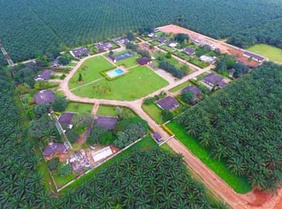
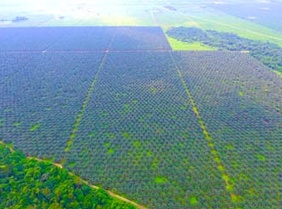
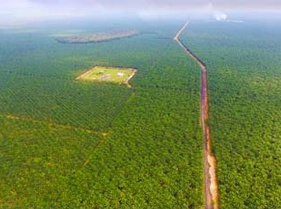
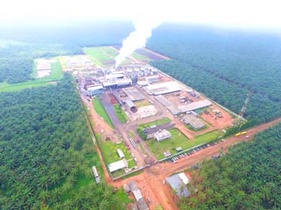

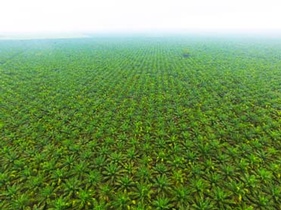
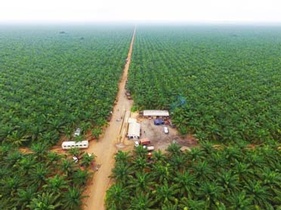
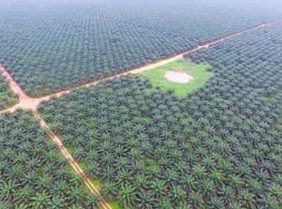
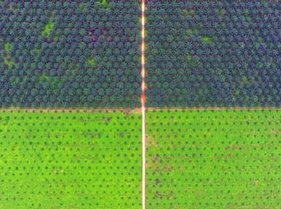
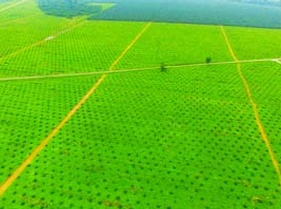
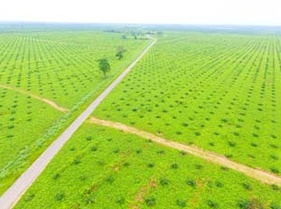
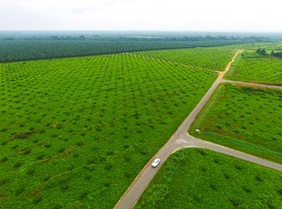
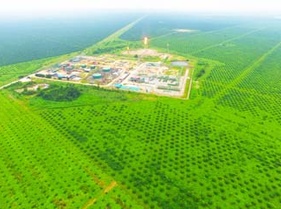
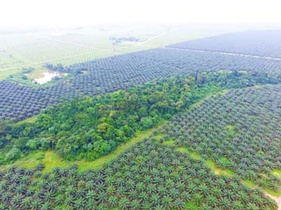
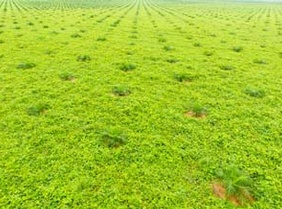
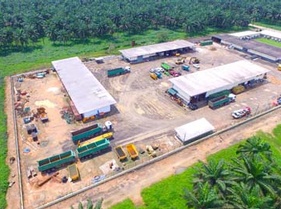
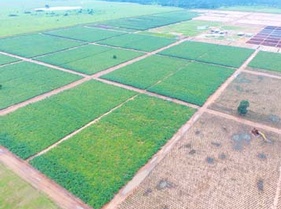
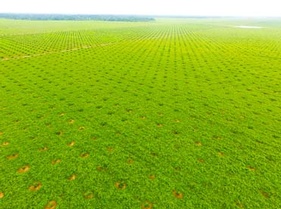
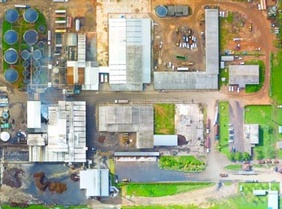
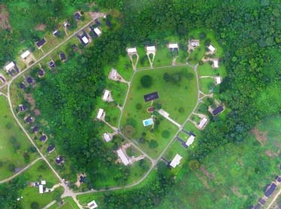
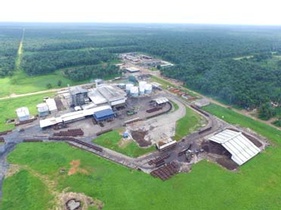
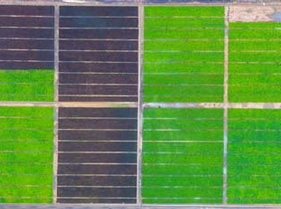
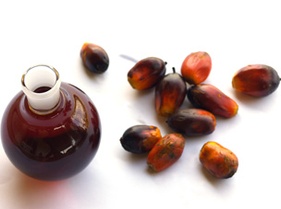


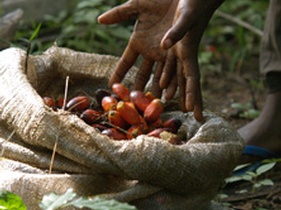

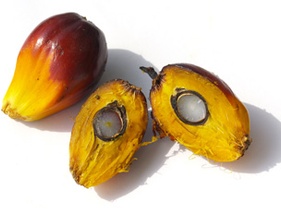
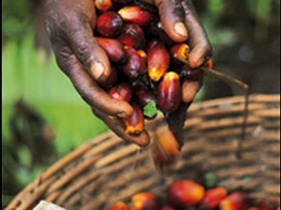
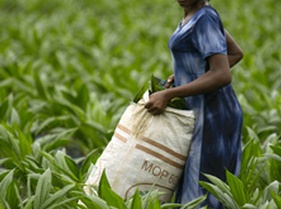
ENVIRONMENTAL MANAGEMENT
Presco believes strongly in sustainable production based on the reduce/reuse/recycle principle. All the organic waste from the mill are used in the plantation as natural soil enhancer helping to minimise the use of fertilizers, or as bio-fuel for the boiler to produce green energy with the turbines.
Constant phytosanitary supervision is implemented to react pre-emptively to pest and disease occurrences. This is preferred to extensive chemical use. By conserving the natural predator-prey cycle Presco keeps its palms free of undesirable pests. Furthermore, the natural occurrence of insects promotes the full pollination of the female flowers.
Mill and plantation operate as an integrated system in respect of waste disposal. The residues of the mill (empty fruit bunches, fibres, kernel shells, ash, palm kernel cake (PKC) and effluent) are recycled.
Once fresh fruit bunches are processed and fruitlets removed for oil extraction, about 20% of the volume of the fruit bunches is recycled as empty fruit bunches (EFB), which are returned to the field as mulch and a valuable substitute for chemical fertilisers.
After extracting palm oil from the mesocarp of the fruitlets removed from the fresh fruit bunches the remaining fibre, the shredded empty fruit bunch and the shell are used as fuel in the boiler, which in turn generates the steam for processing. Presco is running 75% on Green energy.
Ash from the boiler and PKC that cannot be sold also make good fertiliser and are applied in the plantation.
Mill and refinery effluents are digested anaerobically in three large retention ponds. A fourth pond, which is aerobic, completes the process. The solution at the end of the process contains some nutrients and is applied to the plantation as liquid fertiliser. No effluent is released into any river.
In recognition of its continuous efforts to operate in an ecologically-friendly manner, Presco received the prestigious Environment Award from the Nigerian Conservation Fund in 2000.
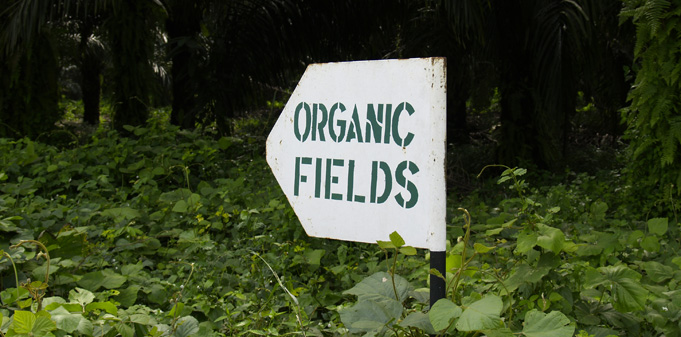
An Environmental Impact Assessment/Social Impact Assessment for Ologbo Estate was carried out by Blue Fin in 2003 and was approved by the Federal Ministry of Environment in 2004. Blue Fin also prepared an Environmental Management Plan for the company.
From 2005, Presco commenced an agro-social-environmental project which is being developed along two complementary lines: Issues related to new development; and issues relating to sustainable management of exiting plantations. The aim of this project is to plan choice of land use and improve agriculture practices in order to minimize negative impacts on natural ecosystems and host communities. It is hoped that it will also be a "learning from doing" process in assessment of environmental and social impacts and will provide a leading example of what can and should be done prior to development of new oil palm project.
The companies in the Siat Group are active members of the Round Table on Sustainable Palm Oil (RSPO). Siat's annual communication of progress report can be viewed on http://www.sustainable-palmoil.org/PDF/Members/Reporting/SIAT.pdf
Presco carries out annual internal environmental audit of all its operations, from which its annual environmental action plan is developed. In addition ,annual external audit is carried out by accredited environmental consultant.
The company has an environmental unit that monitors progress with the Environmental Management Plan and actions agreed as a result of internal and external audits.
GREEN OLOGBO PROJECT
Development of a new concession into a sustainable integrated project for conservation and oil palm production.
In October 2006 Presco entered into a contract with the DOEN Foundation, based in the Netherlands, for the co-funding of the Green Ologbo Project. This project is part of Presco’s development programme for what will become the green Ologbo Estate oil palm plantation and is aimed at ensuring that the planning and execution of this development and its long term management is carried out in a sustainable manner.
The project aims to achieve the following:
1. Development of land use map and conservation action plan
The land use and conservation action plan is based on identification of the conservation value of the concession. Baseline surveys (soil and topographic surveys, socio-economic and ethno-ecological surveys, fauna and flora surveys) provided information. In the case of fauna surveys, observations have been made in both dry and wet seasons.
Complementary ecological field surveys have added to the information database, particularly in the area of high conservation value forest (HCVF) identification. The outcome is a series of accurate maps giving information about agronomic suitability and conservation value for decision making by management.
Data coming from the HCVF identification process have been analyzed in order to produce a conservation action plan. This plan will be updated with the findings of ecological monitoring each year.
2. Protection of conservation areas
Areas set aside for conservation (ie not to be developed as a plantation) are clearly delimited to ensure that farming, logging, hunting and over exploitation of non-timber forest products (NTFP) are minimised. Security camps/gates have been set up at strategic points to control access. Patrolling by a team of eco-guards has also been established. Training of the eco-guards and advice was provided by rangers from Okomu National Park.
3. Ecological and socio-economic monitoring
In order to assess impacts of Ologbo project both on human and natural environment, to measure progress made and propose adequate measures to prevent or reduce degradation of the environment, monitoring is carried out.
This monitoring will be a contribution to the feedback from the local context about the relevance and the feasibility of the principles, criteria and indicators (PC&I) proposed by the Roundtable on Sustainable Palm Oil (RSPO) initiative.
Baseline surveys described above will form the basis against which annual monitoring can be compared. Bio-indicator groups are being evalauted for appropriateness.
To measure the socio-economic impact of the new development on the local communities, an annual monitoring is being set up using a set of indicators based on the RSPO PC&I, as well as a literature review, expert knowledge and baseline surveys already carried out in the surrounding communities and at Presco.
4. Support of local development
Although not in the scope of the project co-funded with DOEN, Presco has extended its successful host community development programme to the Ologbo Estate area in line with its plantation development.
In the long term the development of the Ologbo Estate is expected to provide up to 1000 new jobs as well as contract opportunities. In addition to this Presco will assist in the following areas, as it already does, in its area of influence around its existing estates:
• Educational support: building of new classroom blocks; rehabilitation of existing schools; scholarships; provision of teaching and learning aids and incentives for teachers.
• Potable water supply provision and maintenance.
• Assistance with electrification (major capital projects will be jointly funded with the state government).
• Earth roads maintenance.
• Support for social and cultural activities.
• Out-growers scheme.
Partners in this project are:
Presco Plc
DOEN Foundation
AP Leventis Ornithological Research Institute (APLORI), Jos
College of Education, Ekiadolor, Benin City
Federal University of Technology, Akure
University of Benin
National Parks Service, Okomu National Park





























